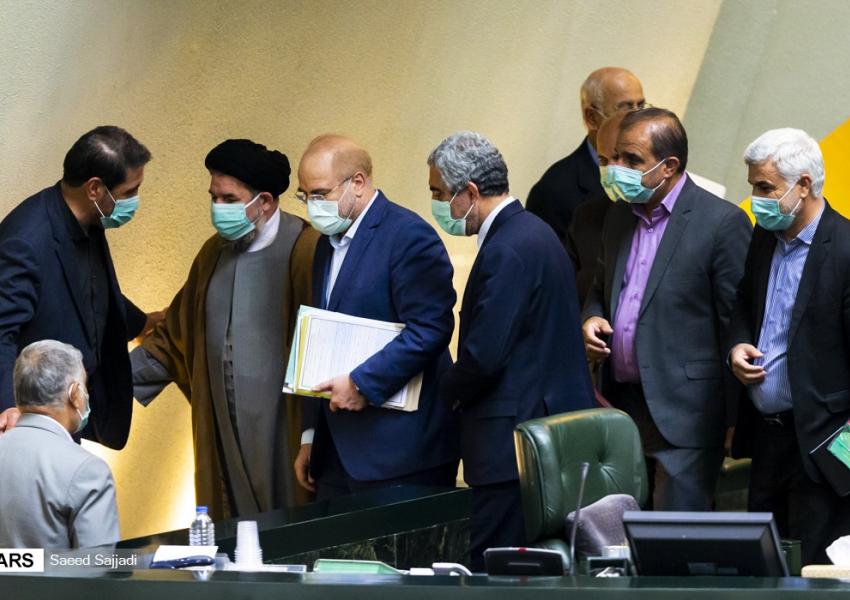
Iran’s Diplomatic Path Kept Open as Guardian Council Faults Draft Nuclear Bill
Iran’s parliament on Wednesday stepped back from its legislation threatening reduced co-operation with United Nations nuclear inspectors after the watchdog Guardian Council found fault with the draft bill passed by parliament on Tuesday. An amendment subsequently agreed by parliament would apparently make the legislation advisory rather than obligatory for the government led by president Hassan Rouhani.
Early Wednesday, Abbasali Kadkhodai, the Guardian Council spokesman, told the Iranian Students News Agency (ISNA) that the council had returned the draft bill to parliament for revision due to “ambiguity about the one-month deadline in Article 6.”
Article 6 of the bill – which is entitled ‘Strategic Action To Eliminate Sanctions and Defend Iranian Nation's Interests’ – would set a one-month deadline for ending Iran’s implementation of the Additional Protocol of the Non-Proliferation Treaty (NPT), under which UN inspectors have certain levels of access to Iran’s atomic facilities.
The GC’s ruling, and parliament’s subsequent reaction, are a victory for Rouhani, who on Wednesday reiterated his opposition to action that he believes would undermine his intention of reviving Iran’s 2015 nuclear deal with world powers, which has been in quasi-limbo since United States President Donald Trump withdrew in 2018.
Rouhani also dismissed claims that he was afraid to face parliamentarians. “Some may think that my absence in the parliament today [to present next year’s budget law] is due to the legislation that they made yesterday but that’s not true,” he told the weekly cabinet meeting. “The administration does not approve of that legislation and considers it damaging to the process of diplomacy but I did not go due to [coronavirus] health protocols, not other things.”
In an emotional atmosphere after last Friday’s killing of nuclear scientist Mohsen Fakhrizadeh, parliament on Tuesday passed an outline bill that as well as limiting Iran’s cooperation with UN nuclear inspectors, would require the stepping up of Iran’s uranium enrichment beyond the limits of the 2015 deal. US President-elect Joe Biden has pledged to return to the agreement, known as the JCPOA (Joint Comprehensive Plan of Action).
Rouhani did not elaborate on his administration's counter-arguments but after the cabinet meeting Vice-President Eshagh Jahangiri said he has written a letter outlining the administration’s views to the Secretary of the Guardian Council, Ayatollah Ahmad Jannati.
In remarks to reporters, Jahangiri reiterated government spokesman Ali Rabiei’s argument that the legislation went beyond parliament’s mandate. Jahangiri stressed that by order of Supreme Leader Ali Khamenei, and “based on the constitution,” the Supreme National Security Council (SNSC) made decisions on the nuclear case with its decisions duly ratified by Khamenei.
Events suggest that despite Fakhrizadeh’s assassination and a parliamentary majority critical of Rouhani, the broader political class is open to reviving the JCPOA, with Iran again restricting its nuclear program in return for the easing of sanctions, especially those introduced by Trump since 2018, which have sent the Iranian economy into a three-year recession.
“I see a factional spirit behind this bill, not a national spirit, and this is dangerous,” warned Heshmatollah Falahatpisheh, former conservative Chairman of the Parliament’s National Security and Foreign Policy Committee, on Wednesday.
“Obliging the administration to put an end to the voluntary implementation of the Additional Protocol means reviving the issue of the possible military dimensions (PMD) in Iran’s nuclear dossier,” Falahatpisheh told Khabar Online. This, he suggested, would draw the incoming Biden administration into a trap “the aim of which is to impose new [UN] resolutions against Iran.”








